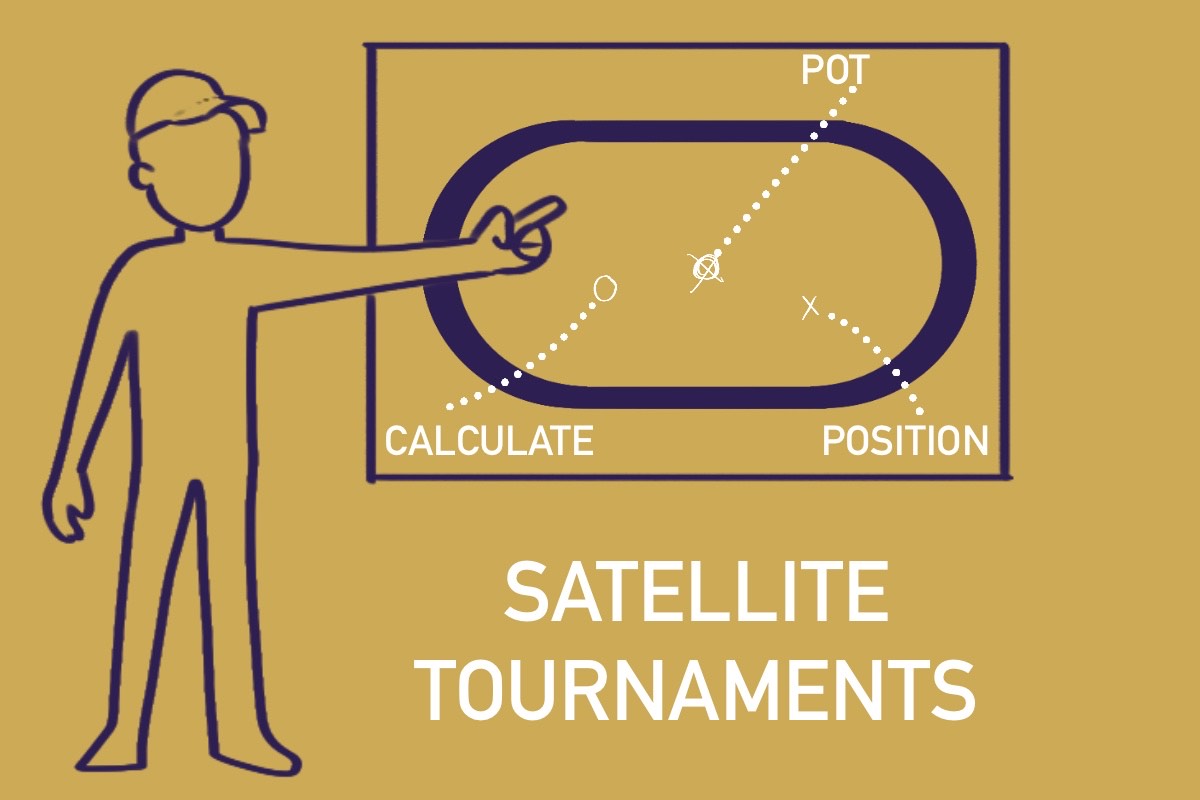Poker satellite tournaments represent a unique way to qualify for higher buy-in events that are subsequently played in a live or online setting. For some pro players, satellites make up a large percentage of an entire schedule, especially during major live poker events hosted by the World Poker Tour, World Series of Poker, and other prestigious series.
Would you like to attempt to qualify for a $1,000 poker tournament for $100 or less? Is a $1,000 poker tournament usually out of your personal bankroll? If the answer is “yes,” then learning more about poker satellite tournaments and their corresponding strategy components can help in your quest to gain entry to larger buy-in poker events.
One of the best resources for mastering the actual strategy that is necessary to have a positive expectation while playing satellites is the Tournament Masterclass course offered by two-time WPT champion Jonathan Little. We’ll talk more about the course later on in the article, and also show you how to get a special discount on all PokerCoaching.com training material by becoming a Premium Member.

What Are Poker Satellite Tournaments?
As stated above, a poker satellite is a one-off poker event that can be played live or online. The goal of almost all poker satellite tournaments is to finish in the top x-percent of the field and win a top prize (usually a seat into the specified, larger buy-in event) as a result.
There are multiple prize pool formats to consider when playing satellite poker. Below we’ve listed a few types of events that can be defined as “satellites” or “qualifiers.”
“Win A Seat” Poker Satellite Tournaments
This is by far the most common type of event that is offered in the form of a satellite. The hosting venue or online poker site will communicate which future tournament the seat is for.
In some cases, players may be able to “cash in” a satellite victory in lieu of taking the seat and actually playing in the future tournament. This isn’t always the case, though. Some sites and hosting venues will automatically register you into the specified future event once you have won your seat, and any “cashing in” of that seat must be taken care of on the player’s end without any assistance from the site or venue.
A good example of an online poker satellite payout structure is as follows:
- $100+$9 buy-in ($100 for the prize pool and $9 for rake)
- 100 total entries (including yourself)
- Top Finishers receive $1,000+$50 seat into future online tournament
- Total satellite prize pool of $10,000
1st-9th Place: $1,050 + Seat
10th Place: $550 (Cash)
11th-100th Place: $0
Notice that whatever prize pool money is left over after as many seats as possible have been awarded is paid out in the form of cash prize money. In the example above, the main goal is to finish in the Top 9. The 10th Place finisher will receive the remaining $550 cash, but any player who finishes 11th-100th will be awarded $0.
Once upon a time in 2003, a Tennessee accountant by the name of Chris Moneymaker parlayed a small dollar online satellite tournament win into a WSOP Main Event seat in Las Vegas — subsequently winning a $2,500,000 cash prize and claiming a coveted WSOP Main Event bracelet.
READ MORE: Chris Moneymaker interview
“Steps” Poker Satellite Tournaments
Although rarer than the traditional “Win A Seat” format, this type of qualifier can result in a player winning a large sum of money by starting at a micro buy-in level “Step 1” and going all the way up to thousands of dollars in cash prizes for a “Step 5” or “Step 6” event.
For the most part, you’ll find “Steps” satellites online, and they will usually only include one table of 9 or 10 players total for each step.
In recent years, online poker sites like PokerStars have created unique ways for players to go all the way from a $0.50 buy-in to winning a Gold Power Pass worth $10,300! This Power Path option can be accessed by all real money PokerStars players.
Poker satellite tournaments that feature “Steps” typically allow players to buy-in directly for any step, except the final one — which must be accessed via an earned ticket. This is to prevent higher stakes players from buying-in directly to the final step and picking off lesser skilled opponents who may have only one shot at winning a very large prize.
Strategy for a Step satellite qualifier are similar to those that allow you to win a seat into a higher buy-in event. You’ll want to check the poker tournament lobby at the start of the Step tournament to verify which places allow you to win a ticket and advance.
World Poker Tour and WSOP Main Event Satellites
Players can compete in these special qualifier events either online or live, although certain jurisdictions will not allow a player to qualify for a live event via online poker play.
Throughout the year, both the WPT and World Series of Poker have satellites (and sub-satellites) that let players try their hand at winning a coveted main event seat with a much smaller buy-in than the featured tournament.
Sometimes these satellites only attract a single table of players, but they can also feature multiple tables of players once the calendar date of the live event approaches.
While very exciting to play, these events are “all or nothing” and can require a buy-in of $1,000 or more just for the satellite (depending on the buy-in amount of the live main event seat that players are competing for).
Poker Satellite Tournaments: Tournament Masterclass by PokerCoaching.com
The Tournament Masterclass course that is available through the PokerCoaching training site includes over 30 hours of material divided into 180 lessons. There are hand examples, special quizzes, and tiered learning processes for live and online events, including both single table and multi table poker satellite tournaments.
While the product itself is not for sale, poker fans anywhere in the world can obtain access to the course for FREE once they have become a Premium level PokerCoaching member.
How Much Does a PokerCoaching Subscription Cost?
By clicking or tapping on the link provided in this article, new players can take advantage of the valuable offer at PokerCoaching, which allows players to learn from top pros for as little as $117 per month.
The Premium subscription includes everything from push/fold charts for short-stacked preflop play in Texas Hold’em to the Crushing High Stakes Poker series taught by Brock Wilson.
If you’d like more information before deciding whether to purchase a premium PokerCoaching membership, you can consult our Tournament Masterclass Review page.
PokerCoaching Premium Subscription Plans start at $117 per month if you purchase a 3-year subscription up-front.
A two-year subscription plan will cost $123 per month with an up-front payment of 24 months, while a one-year plan is priced at $1,575 USD (or $131 per month).
Individuals who would like to try out the service with a smaller commitment may do so by purchasing a one-off monthly Premium subscription for just $147 USD.
What Do I Get With a PokerCoaching Premium Subscription?
Aside from specialized material that thoroughly explains the strategy behind poker tournament satellites, premium PokerCoaching members will receive these benefits:
- Interactive quizzes that revolve around actual poker hands (Standard Plan)
- Monthly homework assignments with Jonathan Little himself (Standard Plan)
- Push/Fold charts for short-stacked preflop play along with an app to consult the charts on (Standard Plan)
- Weekly webinars featuring live coaching
- How to Bink Tournaments course
- Crushing High Stakes Poker course (with Brock Wilson)
- How to Run Deep in Large Field Tournaments course
- Cash Game Masterclass
- Tournament Masterclass
- Advanced poker lessons using solver analysis
- 30-day tournament and cash game challenges
- Game Theory Optimal (GTO) preflop charts
If you would like to try out the Standard membership plan, the cost will be $49 per month. However, Standard plan members only receive access to a small portion of the package of products that is available to Premium subscribers.
Notably, if you’re just starting out your path in poker and want to take the first steps towards poker study, you can get Jonathan Little’s Master The Fundamentals course absolutely free. This is a perfect way for new players to become introduced to the ins-and-outs of poker strategy. The course covers everything from the basic rules of different poker variants to bet sizing, and only requires a valid email address to receive.
You can view our full Master The Fundamentals course review here.
Basic Tips for Playing Poker Satellite Tournaments
Plenty of folks prefer to do their poker study via courses, while others opt to read poker books. As such, before we go any further, we’d be remiss if we didn’t mention two excellent poker books on the topic: Dara O’Kearney and Barry Carter‘s Poker Satellite Strategy and Bernard Lee‘s Poker Satellite Success.

Anyhow, once you’ve played a few satellite qualifiers (and once you’ve had a bit of experience playing on the “bubble” of these events), one thing will become immediately clear: The only thing that’s important is finishing in one of the top spots: nothing else.
To provide a very rudimentary example, let’s say you’re competing at a final table of a poker satellite that pays a main prize to only the top three finishers, with fourth place receiving nothing. If the action is 4-handed, you’ll want to be extremely wary of committing your entire chip stack if you happen to be one of the chip leaders.
EXAMPLE (assuming 5M/10M blinds)
PLAYER 1 (YOU): 30M chips (BIG BLIND)
PLAYER 2: 10M chips (UTG)
PLAYER 3: 10M chips (CUTOFF)
PLAYER 4: 40M chips (SMALL BLIND)
Due to extremely tight play at the final table, the blind amounts have advanced in this scenario to create a “super turbo” environment. While this may not be typical for normal tournaments, poker tournament satellites often feature (and require) tighter play due to their unique payout structures.
1st Place: Big Prize
2nd Place: Big Prize
3rd Place: Big Prize
4th Place: $0
If Player 2 opens by going all-in preflop, and then Player 3 calls and Player 4 comes over the top with another all-in, there will be a total of 70M chips in the pot including your own Big Blind. This means you have 20M chips behind after contributing the Big Blind amount.
Player 1 (YOU): As-Ad
You’re looking down at Pocket Aces with only two Big Blinds remaining in your stack with 7 Big Blinds already committed into the pot. In a typical tournament situation, this would be an easy call for you (Player 1) and you’d gladly take your chances with Pocket Aces preflop.
However, your three opponents have already gone all-in on this hand, and at least one is guaranteed to be eliminated as a result — as long as the pot is not chopped on the river. So while Pocket Aces may be the absolute best hand in terms of poker hand rankings, you would likely be required to fold your hand preflop in this unique satellite tournament scenario.
If Player 2 wins the pot, the Player 3 is eliminated and the entire satellite tournament concludes.
If Player 3 wins the pot, then Player 2 is eliminated and the entire satellite tournament concludes.
If Player 4 wins the pot, then Player 2 and Player 3 are eliminated and the entire satellite tournament concludes.
Even if there is a chopped pot, the tournament would immediately end unless Player 2 and Player 3 tied, or if all three players tied on the river.
While the example may seem very basic on its surface, it’s very important to study strategy for poker satellite tournaments if you’re planning on playing a lot of them.
And one of the best resources available on the internet for learning how to play these unique events is the Premium subscription offered by PokerCoaching.com.
Best of luck in your next poker satellite event!







